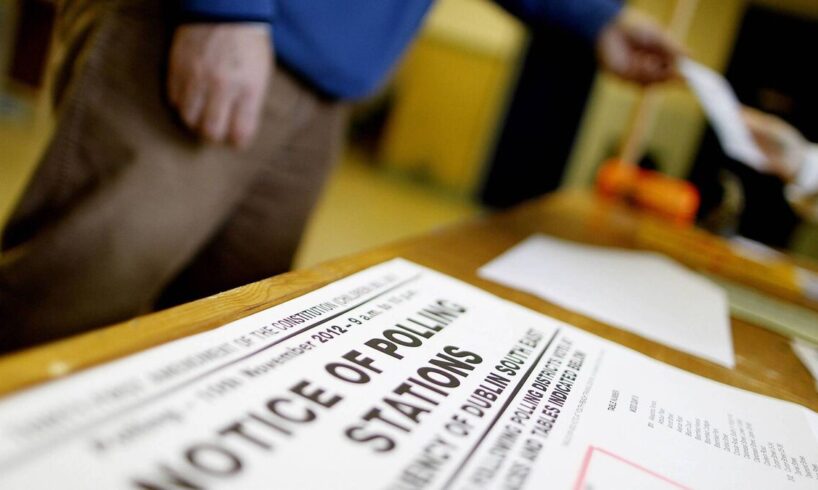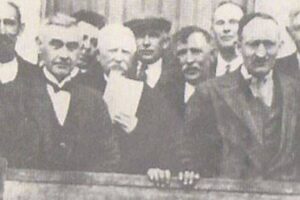
The level of dissatisfaction with the choice available to voters at the presidential election is such that discussion has already descended into highly speculative ‘what if’ scenarios.
The election hasn’t happened yet and already there is considerable fallout for many of those in the campaign and on its periphery.
Political judgements are being questioned and party leaders are facing uncomfortable scrutiny for their decisions.
The closing moments of the nomination phase were consumed with annoyance among arch-conservatives that their preferred candidate, Maria Steen, did not get on the ballot.
Accusations of prevarication and duplicity were levelled by the disappointed side while others asserted that the Aontú-led Steen group was disorganised and slow to prepare.
Had there been earlier organisation and more co-operation among small parties, and independent TDs and senators, Steen might have received the nominations she needed to enter the election.
Catherine Connolly has a commanding lead in the polls and could be the happiest politician in Ireland on October 25.
But she is an independent politician, a sole trader, and although many within her supporting left-wing coalition will claim credit for her probable victory, there are already fractures emerging within her alliance.
A group within the Labour Party is clearly hostile to Connolly’s candidacy.
This opposition has been vocalised publicly by Alan Kelly, former leader of the party, but also by others including party grandee Fergus Finlay and former TD Mary Upton.
Presidential election candidates Heather Humphreys and Catherine Connolly. Picture: Conor O’Mearain/PA
All of them have spoken about their unhappiness with the decision to back Connolly who they see as a thorn in the side of the party since she left Labour, in a disagreement over not being selected as an election candidate.
This past week also brought public declarations from prominent Green Party members, unhappy with that party’s decision to support Connolly.
Brian Leddin, a former TD, announced that he would be ending his membership of the party and cited Connolly’s lack of support for significant environmental measures as one of the reasons that he would not be supporting her.
Pauline O’Reilly, a former senator and chair of the Greens, focused on Connolly’s foreign policy positions as the reason she would not be voting for her.
Connolly may have united the parties of the left in support of her but not without some controversy and rancour.
A Connolly win will likely smooth over the cracks but a loss would result in some party leaders facing further questions about how the party made its election decisions.
Sinn Féin will be pleased if Catherine Connolly becomes the 10th president of Ireland.
The party rowing in behind her gave her candidacy a significant boost in early campaign polls.
Sinn Féin party members turning out to vote in big numbers is essential for her to get over the line.
The party is uniquely disciplined and any chagrin at the outcome of the election will surely be discussed only within the organisation.
But the party will face big ‘what if’ questions when the dust settles.
If the party had run Mary Lou McDonald for president, she would surely have won in the context of the current candidate choice.
One of the most effective speakers in the Dáil, hugely experienced, and an on-the-ground campaigner in the mould of Bertie Ahern and Enda Kenny, she would have been on a direct ticket to Áras an Uachtaráin.
The party would have its first president, the election campaign would have been profoundly altered, and much more focused on the future position of Northern Ireland.
This may have been an unusual strategic mis-step by Sinn Féin.
Fine Gael is still in the running. Heather Humphreys has improved notably over the campaign.
But she is still lagging well behind in second place which is mostly the story of Fine Gael’s involvement with presidential elections.
The ‘what ifs’ in this case are more despondent. The party had a different candidate who had to step back due to serious illness.
Humphreys is not a bad candidate but throughout the election she has struggled to shake off the impression that she was the second choice for Fine Gael.
But if presidential election regret is a competition, surely Fianna Fáil win the gold medal.
On every radio programme, and at every coffee break in Ireland, the half-serious question ‘what if Jim Gavin wins the election?’ is asked.
Constitutional experts are on active duty explaining the permutations and the Electoral Commission has been called upon to explain the voting implications.
The outcome is highly unlikely and at the same time a marvelous topic for speculation.
And all the while it keeps Gavin’s disastrous candidacy for Fianna Fáil in the spotlight.
Jim Gavin’s disastrous candidacy for Fianna Fáil is still in the spotlight. Picture: Conor O’Mearain/PA Wire
His name will be on the ballot paper, some of his posters are still up, some of us are wondering if we will get his election letter in the post, there is talk of it becoming an election nerd collector’s item, yet Gavin has halted his campaign and is no longer seeking the office.
Six of the nine presidents have come from Fianna Fáil.
Until 1990, Fianna Fáil was the only party that could win a presidential election.
But its experiences in recent elections has been dismal.
It didn’t field a candidate in 2011 but Seán Gallagher, whose campaign imploded in the last week, was often seen as a proxy candidate.
In 2018, the party, like Fine Gael, didn’t run a candidate and 2025 is a disaster of epic proportions, the candidate has actually withdrawn, but not officially, and the party is riven with recrimination that has even called the long-standing leadership of Micheál Martin into question.
Presidential elections have an unusual place in Irish election folklore. The presidency is a ceremonial role, and few advantages have come to parties successful in those elections.
But the downsides are huge, party leaders have been pushed out and reputations have been ruined. Fortunately, it will all be over soon.
Professor Theresa Reidy is a political scientist at University College Cork.





